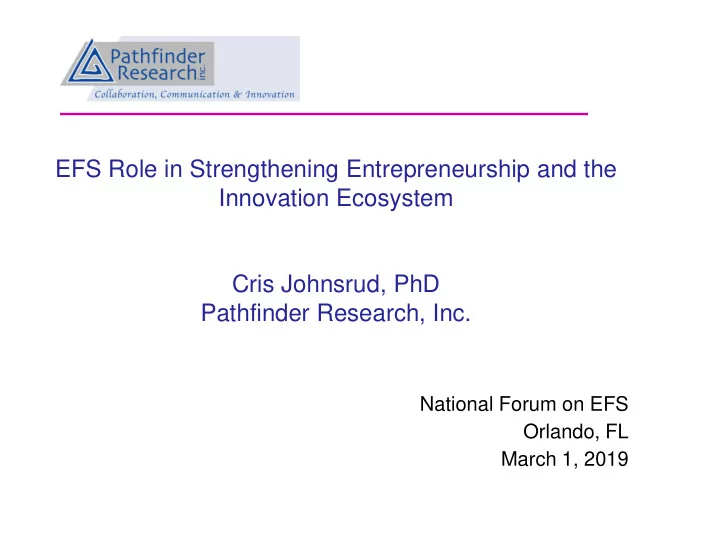

EFS Role in Strengthening Entrepreneurship and the Innovation Ecosystem Cris Johnsrud, PhD Pathfinder Research, Inc. National Forum on EFS Orlando, FL March 1, 2019
What Do Entrepreneurs Need? • Mentors • Business & technical experts • Specialized equipment • Interns & other talent • Networking opportunities
Access options • Business incubators • Accelerator programs • Innovation networks • Personal friends & acquaintances • Web-based networking sites (LinkedIn) • Expert Finder Systems
Barriers to access • Fragmented community resources • Colleges & universities are “black boxes” • Difficulties identifying potential interns & experts • No common point of access by outsiders • Cultural barriers • Business culture vs. academic culture • Business culture vs. government culture
Organizational Culture • Language • Economy • Power structure • Belief system/Values • Social structure
Organizational culture Power and Economy Authority Social Values and Organization Beliefs
Organizational Culture Economy— “Return on Investment,” “costs vs. benefits,” “rewards & incentives” Power and Authority— “stakeholders,” “management vs. science,” “command vs. consensus” Social Organization— “departments vs. functions,” “cliques,” “teams vs. individual” Values and beliefs— “public domain vs. confidentiality,” “methodology vs. bottom line”
Culture Shock “Culture Shock” occurs when one moves from one cultural system to another. Expectations, values, priorities, rules of behavior, language, and “the way things get done around here” can be very different from what one has learned in his/her own culture.
Business vs. Academic Culture Academia Business Economy— Economy— Research Grants & Contracts Profits Donors/Foundations Costs of production Legislative funding Investors Power & Authority— Power & Authority— Full & Assoc. Professors CEO/Founders Dept. Chairs/Deans Investors Administrative VPs Boards of Directors Provost/President Customers
Business vs. Academic Culture Academia Business Social Organization— Social Organization— Student groups/clubs Project teams Professional societies Unions Faculty committees User groups (tech) Unions Values— Values— Academic freedom Return on Investment (ROI) Research methodology Beating competitors to market Publications Confidentiality Creating new knowledge Bottom line/profits
Culture conflicts • Academic researchers often view business organizations as evil— • Want to control research methods and outcomes for its own benefit • Profit seeking can lead to falsifying of research outcomes • Business is not interested in the public good
Culture conflicts • Business managers often view academic research as wasteful and impractical • Faculty researchers are not in touch with the ‘real world’ • Researchers are egotistical and a pain to work with • Researchers do not understand the need for rapid completions of product development to beat competitors to the market
How Can EFS Help to Bridge the Gap? • Create “business-friendly” access points on EFS websites • Identify researchers and students who are willing to work with entrepreneurs and other businesses on projects • Align expertise areas with standard industry classifications where possible
How Can EFS Help to Bridge the Gap? • Help educate researchers and students about the role of entrepreneurs in local economic development • Partner with academic career development organizations to improve access to internship opportunities with local startups
How Can EFS Help to Bridge the Gap? • Reach out to local innovation groups and business leaders to obtain input for EFS • Educate local, county and state entities about EFS and its value to the innovation ecosystem
How Can EFS Help to Bridge the Gap? • Draw on incubator programs to spread the word about EFS to entrepreneurs • Foster collaborations between technical experts from both business and academia
Pathfinder Research Thank you! Dr. Cris Johnsrud 386-454-5676 PathfinderResearchInc.com
Recommend
More recommend